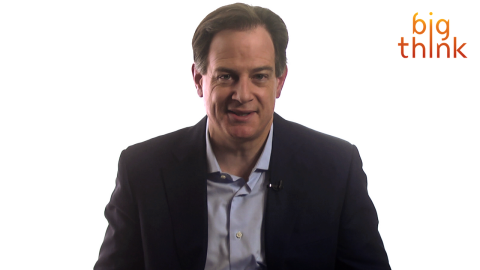Confidence Speaks Louder, with Michael Fenlon

PwC Global Talent Leader Michael Fenlon appears in today’s featured Big Think interview to discuss his firm’s upcoming Aspire to Lead global video webcast. The topic is “The Confidence to Lead” and will be focused in particular on the roles of women in leadership positions as well as the ways in which we as a collective can take on harmful social stereotypes:
Fenlon hits on two vital cogs in the leadership machine — competence and confidence:
“There are consistent research findings that show that men tend to overestimate their competence and women underestimate their competence. Research has also shown that women are actually more competent leaders and that startups with women at the helm, that boards with more women on them, and that organizations with greater gender diversity outperform their competitors.”
Competence is important for discernible reasons. Confidence is a bit trickier. This is because many people are able to fake competence yet still excel. Surely we’ve all been around that one person who gets by on charisma alone while punting tough decisions to other people. Whether that sort of leadership style is particularly beneficial is the stuff of a separate conversation. What’s important to note for our purposes is that confidence, as vital a trait as any leader can possess, cannot simply be faked.
In the video, Fenlon cites research suggesting varying levels of confidence between genders. He cites the work of Claire Shipman and Katty Kay, authors of The Confidence Code, on the science of self-assurance and the impact of gender socialization on perceptions of competence, confidence, and behavior. Shipman and Kay write about social stereotypes that disproportionately link men with competence and how perceived confidence fuels them (while also fueling the inverse). One of the main goals for Aspire to Lead is therefore to instill greater confidence in young women leaders while erasing harmful stereotypes that all too often get in the way:
“Understand that if you aspire to a career, a profession, a leadership role, in many respects you’re going to be judged and evaluated on your ability to bring out the best in others … to bring out the best in others we’ve got to start by bringing out the best in ourselves by building self-awareness, understanding our own implicit beliefs.”
In order to impart confidence in others, we have to first find it in ourselves. This is why, in some ways, confidence transcends most other leadership traits. But it’s not enough simply to feel self-assured. There has to be a movement in place to silence stereotypes that get in the way of progress and profitability. Two months ago Sheryl Sandberg and Adam Grant authored a terrific four-part series of short articles on women and work for The New York Times, in which they summarize a variety of studies related to stereotypes, blind spots, and other gender dynamics. For example, in this article they share research that shows it’s not enough to simply understand your implicit biases, but it’s critical to encourage people to overcome their biases, and that there are significant benefits for correcting blind spots.
If you’re interested in learning more about the power of stereotypes, Fenlon recommends the work of psychologists Mahzarin Banaji and Anthony Greenwald, authors of the book Blindspot. The authors document extensive research findings such as strong gender associations (“surgeon=male”) while explaining the gaps between all our explicit and implicit beliefs — the titular blind spots. You can even test your own hidden biases via this website.
So what’s the ultimate takeaway here? First, the advancement of women leaders requires a new wave of boldness from the next generation. Confidence and self-assurance are vital to a leader’s success. Luckily, they can be instilled in others with the right amount of delicacy. Second, we must quash the stereotypes — both explicit and implicit — that pigeonhole certain people into various classifications of profession, temperament, and overall being. Checking off these two goals will allow for a reframing of the professional ecosystem and a new understanding of ability by way of gender.
This video is the fifth in a series brought to you in partnership with PwC. Previous videos include:
–Carol Sawdye: Allow a Sense of Urgency to Propel Your Career
–Coaching the Next Generation of Women Leaders, with Amanda Mesler
–Tara Sophia Mohr on the Three Keys to Empowering Young Women
–Authenticity Will Close the Confidence Gap, with Claire Shipman
On February 27th, PwC will host a live webcast on developing great women leaders with ABC News’s Claire Shipman and her “The Confidence Code” co-author Katty Kay. Register here for the webcast, and follow the conversation on Twitter: #PwCAspire. Big Think will be featuring more related videos and other content throughout the month.





